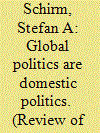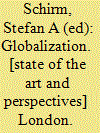| Srl | Item |
| 1 |
ID:
120479


|
|
|
|
|
| Publication |
2013.
|
| Summary/Abstract |
Since 2008, the leaders of industrialised and emerging economies have engaged in steering the global economy through the G20. Divergent national positions were to be expected based upon the different stages of economic development and according to previously existing international groups. The actual controversies in the G20 did not reflect these patterns, however, but showed divergence both between industrialised countries and between emerging economies. In explaining this puzzle, I argue that the driving forces for global economic governance have ceased to be industrialised or emerging countries' alliances and levels of development. Rather, the causes for the positions of G20 members can be found in economic interests and ideas dominant in the domestic politics of countries. These societal influences shape governmental preference formation in both industrialised and emerging countries and consequently influence their behaviour in global governance. The resulting divergences weaken previously existing groups such as the G7 and the BRICs, and create a new pattern in world politics. This societal approach to explaining governmental positions in global economic governance is exemplified on the core G20 issues of stimulus/public debt and global imbalances/exchange rates.
|
|
|
|
|
|
|
|
|
|
|
|
|
|
|
|
| 2 |
ID:
075946


|
|
|
|
|
| Publication |
London, Routledge, 2007.
|
| Description |
xv, 229p.
|
| Standard Number |
0415405661
|
|
|
|
|
|
|
|
|
|
|
|
Copies: C:1/I:0,R:0,Q:0
Circulation
| Accession# | Call# | Current Location | Status | Policy | Location |
| 052160 | 337/SCH 052160 | Main | On Shelf | General | |
|
|
|
|
| 3 |
ID:
104353


|
|
|
|
|
| Publication |
2011.
|
| Summary/Abstract |
Financial crises underline the necessity for more effective global governance. Despite the creation of the Basel II Accord, no agreement has been reached on the reform of the International Monetary Fund (IMF). Why do governments only selectively agree to reform global governance? I argue that convergence and divergence of governmental positions cannot be explained solely by the logic of the international system, institutions or globalization. Instead, they strongly reflect domestic ideas and interests. Furthermore, the ability of governments to compromise internationally is influenced by the different impact of domestic ideas and interests. With regard to their prevalence in domestic preference formation, ideas prevail when governance affects lobby groups diffusely and poses fundamental questions on the role of politics in governing the economy. Interests prevail when lobby groups are affected directly and new governance concerns a specific distribution of costs. These arguments are tested on the preference formation of the United States and German governments on the IMF and Basel II.
|
|
|
|
|
|
|
|
|
|
|
|
|
|
|
|
| 4 |
ID:
097732


|
|
|
|
|
| Publication |
2010.
|
| Summary/Abstract |
Emerging powers such as Brazil and Germany increasingly articulate their desire for leadership in global governance. Examples comprise the bids for permanent membership in the UN Security Council and the founding of the G20 at the WTO meeting in Cancùn. Emerging powers, however, often fail to achieve their goals. This article focuses on followership as a core condition for success and failure of emerging power leadership in global governance. I argue that in order to perform successfully, any leadership must be accepted by followers and that followership depends on the credible inclusion of the interests and/or ideas of potential followers into the leadership project. This argument is tested in case studies on Brazil's and Germany's bids for structural power in the UNSC, for directorship in international organizations and for policy positions in the WTO trade negotiations.
|
|
|
|
|
|
|
|
|
|
|
|
|
|
|
|